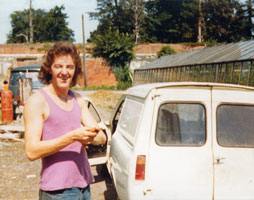14 December 2006 Edition
Remembering 1981 - Paddy Agnew interviewed

Louth’s H-Block TD — 25 years on
As a republican POW, Paddy Agnew topped the poll as a H-Block candidate in the historic 26 County general election during the Hunger Strike of 1981. Here, Agnew talks to ELLA O’DWYER about his imprisonment, memories of the Hunger Strikers and the support he received from the people of his native Louth when they went to the polls 25 years ago.
Dundalk man Paddy Agnew was born in 1955. His grandfather, also called Paddy, was interned during the Tan War. While this factored in Paddy’s decision to get actively involved in the republican struggle at the age of 16, Bloody Sunday was another influence. The fact that refugees were coming from the North to stay in the local Clan na Gael Hall also made an impression on him. But, as he puts it himself, “Republicanism was just in me.”
Agnew has served time in various jails for his republican beliefs – Portlaoise, Mountjoy, Crumlin Road and the H-Blocks of Long Kesh. His first encounter with prison was in 1973, when he was charged with “trying to procure guns for the IRA and membership”. He was sentenced to three years.
In 1977, he was captured with Arthur Morgan and others by the British: “We were arrested on an IRA operation on a boat in Carlingford Lough. We were a fearless group of young people,” he laughs.
Sentenced to 16 years’ imprisonment, Agnew went on the blanket and later on the no-wash protest. The conditions in the Blocks at the time were “horrific”.
Of the 1981 Hunger Strike, Agnew says: “We were totally gutted when Bobby died. As more and more men died you got kind of battle-hardened.” He described the treatment the men received in the Blocks as “desperate”.
“It was very rough – the beatings and all – but you just got on with it. You’d take one day at a time.”
In the 1981 26 County general election, Paddy was selected as the H-Block candidate for the Louth constituency: “There was huge support from the people of Louth. I couldn’t get over it. I was in regular contact with outside and knew of the tremendous support we had.”
He recalls Pat McGeown shouting across to his wing: “That effort (Paddy) has just topped the poll” and that was how he heard the result of the count. At the time, part of the thinking in standing candidates was that the election of TDs would put pressure on the Irish Government to push for a just resolution of the Hunger Strike, but that wasn’t to be.
“Nothing came of the election result in terms of saving the men’s lives. The Irish Government was every bit as bad as the Brits. I was shattered when Big Doc died.” Asked if he ever contemplated standing for election since, he says, “No. The ‘81 result was a prisoner issue. The prisoners won the seat then.”
Paddy Agnew remembers seeing some of the Hunger Strikers just before the 1981 fast, including Bobby Sands. He knew that Sands was committed to going the whole way. He also saw Raymond McCreesh at Mass before Ray commenced the fast.
“As we were leaving Mass I said to Ray, ‘Chifidh me thú’ (I’ll be seeing you). Raymond just smiled back at me. We both knew we wouldn’t be seeing each other again. I also remember seeing Tom McElwee sitting on the hot-plate (an item for keeping food hot) trying to keep himself warm.”
Paddy Agnew was released from prison in 1986. “I took a few weeks off and then I joined the Gerard Halpenny Sinn Féin Cumann. Halpenny had done time in the ‘40s. There were great workers in the cumann, very strong and it’s improving ever since.” Asked how he felt in 2002 when Arthur Morgan won back the Louth seat he had won in 1981, Agnew says: “We were all over the moon. I had Arthur on my shoulders.”
On women in the republican struggle, Agnew believes in total equality: “There was a time when the trend was for the male to ‘take the rap’ if there was a woman Volunteer involved. I never believed in anything like that. We were all the same.”
Paddy Agnew is very encouraged by trends in the movement now – especially regarding the number of young people getting involved. “It’s good to see so many new people involved. It’s not just a matter of ‘the usual suspects’. In my time we looked to 1916 for our motivation. Today young people look to 1981. That’s how powerful the effect of the Hunger Strike was.”
Asked how, on reflection, he feels about the Hunger Strike 25 years on, he says: “What’s done is done and there’s great loyalty and comradeship in the movement. Republicanism is something that’s in you – it’s like what Bobby Sands described as The Rhythm of Time.”
Paddy Agnew still lives in Dundalk and is an active member of Sinn Féin.


